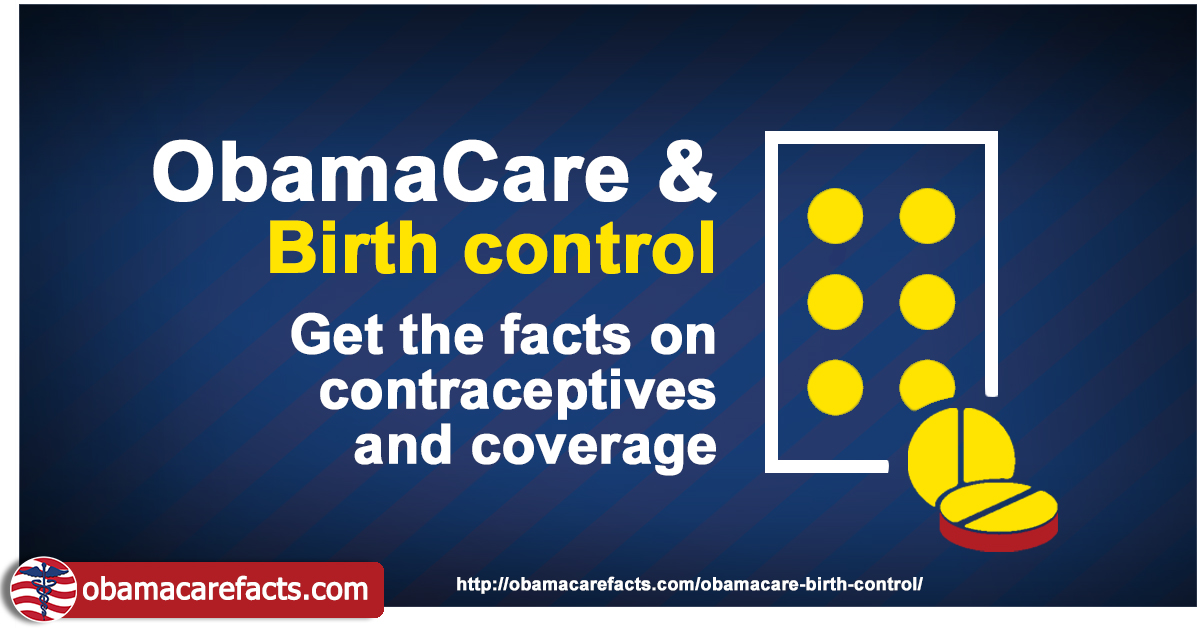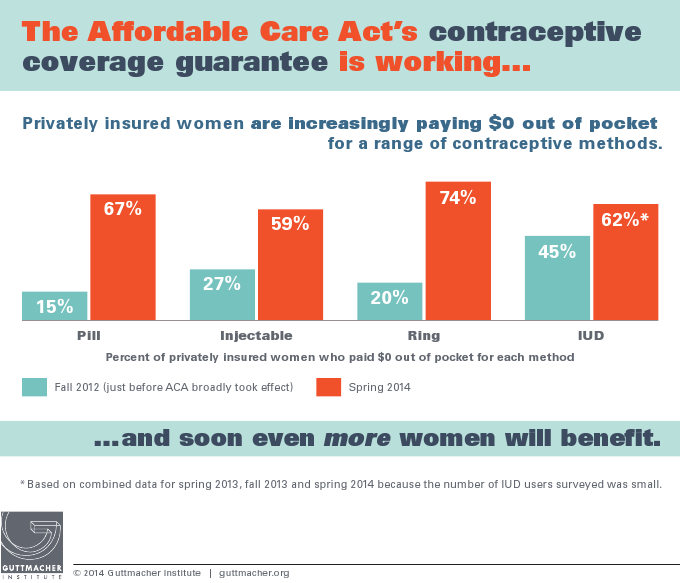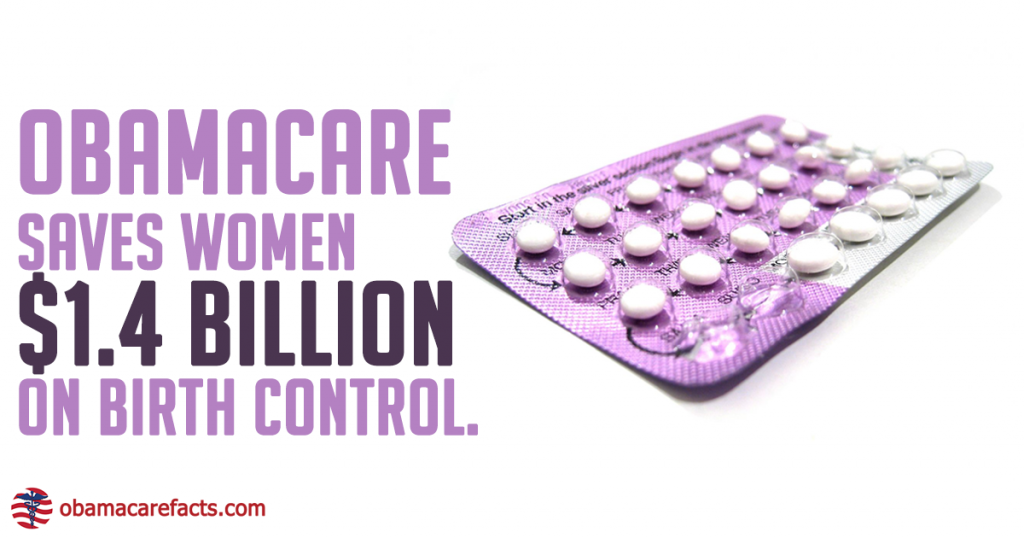ObamaCare Birth Control








ObamaCare covers one type of birth control per person from each of 18 FDA-approved categories at no out-of-pocket cost, although some plans have exemptions.
This page will tell you what kinds of birth control are covered, which health plans have exemptions, how to get free birth control under the Affordable Care Act, and how to get help even if you don’t have insurance.
UPDATE 2022: The Affordable Care Act (AKA ObamaCare) still requires complete contraceptive coverage despite the recent decision on Roe V. Wade.
UPDATE 2017: A rule announced Friday, Oct. 6, 2017 by the Trump administration relaxed the ACA’s birth control requirement for employers, meaning fewer women in the workplace have plans that cover birth control (due to more employers being able to obtain a religious exemption). With that said, despite minor changes the ACA is still the law of the land and contraceptive services are still covered.

What Birth Control Is Covered?
According to HealthCare.Gov Food and Drug Administration, approved contraceptive methods prescribed by a woman’s doctor are covered. This includes:
- Barrier methods used during intercourse like diaphragms and sponges
- Hormonal methods, like birth control pills and vaginal rings
- Implanted devices, like intrauterine devices (IUDs)
- Emergency contraception, like Plan B® and ella®
- Sterilization procedures
- Patient education and counseling
Plans aren’t required to cover:
- Drugs to induce abortions
- Services related to a man’s reproductive capacity, like vasectomies
The 18 Contraception Categories
Under the Affordable Care Act, non-grandfathered plans must cover specified recommended preventive care services without cost-sharing, consistent with PHS Act section 2713.
The 18 types of contraception are:
• Sterilization surgery
• Surgical sterilization implant
• Implantable rod
• Copper intrauterine device
• IUDs with progestin (a hormone)
• Shot/injection
• Oral contraceptives (the pill), with estrogen and progestin
• Oral contraceptives with only progestin
• Oral contraceptives, known as extended or continuous use that delay menstruation
• The patch
• Vaginal contraceptive ring
• Diaphragm
• Sponge
• Cervical cap
• Female condom
• Spermicide
• Emergency contraception (Plan B/morning after pill)
• Emergency contraception (a different oral medication named Ella)
What Plans Don’t Have to Cover Birth Control
As of July 2015 all plans, except for the following, must provide at least one method from each of the 18 FDA-approved birth control categories at no out-of-pocket costs:
- Religious employer health plans (houses of worship don’t have to provide coverage. For all other religious employers women are provided contraceptive coverage through a third party).
- Grandfathered health plans (plans purchased before March 23, 2010)
- Shor-Term health insurance
- Alternative plans offered by insurers that specifically exclude some forms of birth control (each exchange is supposed to offer at least one plan that doesn’t provide coverage for controversial contraception).
All non-exempt plans cover basic birth control, but only some specific plans cover all birth control types. The rule is that each of the 18 FDA-approved categories has to be covered by at least one drug or service, not that everything related to contraception must be covered. Plans that were “grandfathered in” before the new ACA protections started may be exempt from offering contraception for free. This includes some group health plans. Also, short-term health insurance does not have to provide contraception.
Religious Employer Exemptions and Non-Profit Religious Exemptions
Some “religious employers,” houses of worship, health sharing ministries, a few employers who got religious exemptions, non-profit hospitals, some institutions of higher education, etc. don’t have to provide contraceptive services or counseling. However, after a rule passed by the Obama administration in July of 2015 employees of religious employers are provided with free contraceptive coverage through a third party in most cases. Houses of worship are exempt from this rule, and health sharing ministries are unaffected by this rule as they are not employers.
If you work for an exempt religious employer and use contraceptive services, you may have to pay for them out-of-pocket or seek low-cost options through clinics or Planned Parenthood. Contact your employer or benefits administrator so that you know what your personal coverage is.
Some non-profit institutions with exemptions don’t have to contract, arrange, pay, or refer for contraceptive coverage. They do not prevent you from using an insurer or third party administrator to make separate payments for contraceptive services that you use (even if the new rule for employers doesn’t apply to that institution). So if the entity you get coverage through is exempt from the requirement to provide contraception, you may have options.
Is all Contraception Free Under ObamaCare?
You can expect to pay for some types of birth control on almost all plans (for example, a plan may only cover generics or may have a copay for a certain birth control type). Also, some plans are exempt from providing any contraceptive coverage as we have discussed.
Some employers and institutions were exempt due to religious objections for a short period after a Hobby Lobby lawsuit. However, a new rule issued by the Obama administration has provided free contraceptive coverage through a third party, so employees still have access to birth control at exempt employers. This is true for all religious employers except houses of worship. In a health sharing ministry, you can be kicked off the plan for accessing contraceptive services. Grandfathered plans and short-term plans don’t have to cover contraception at all.
How to Get Free Birth Control
If you have Medicaid, an employer plan, or an individual or family plan sold after 2010 at least one type of birth control from each of the 18 FDA-approved categories is covered for free (at no out-of-pocket cost-sharing before your deductible).
You can get prescriptions for free birth control from:
- Private and Public Health centers including community health centers, walk-in clinics, and Planned Parenthood.
- A Family Doctor
- A Hospital specifically in cases where emergency birth control is needed.
Prescriptions can then be filled in the facility or at a local pharmacy. Some birth control, like spermicide, can be sold over the counter and can be purchased at a local pharmacy. Emergency birth control like plan B may be covered without a prescription.
TIP: Make sure to check with your insurer first to understand what birth control is covered under your plan.
What If I Don’t Have Insurance?
If you don’t have insurance and you have a low income you may be able to access free women’s health services including birth control at public health centers, from organizations like Planned Parenthood, and from private health centers that offer assistance.
If you don’t have coverage and can’t get free birth control due to income, you can often get very cheap generics at your major local pharmacy by paying cash and letting the pharmacist know you don’t have health insurance. You can also try looking into free RX cards offered online.
If you don’t have coverage due to income, make sure to look into Medicaid / CHIP and cost assistance options.
Is Birth Control Free Under ObamaCare?
Some birth control is completely free with no out-of-pocket cost, even before your deductible, under all qualifying non-grandfathered plans, but not all birth control is free. If your plan covers birth control, then at least one choice from each of the 18 above FDA-approved categories must be offered with no cost-sharing (your insurer pays the full amount). If your plan is exempt, due to you having short-term health insurance or a grandfathered plan, then your birth control services may not be covered. You can still try to get free coverage by using these tips.
Tips on getting free birth control:
- If you have a choice of medical insurance plans, try to get a plan which covers all types of birth control. If you need a particular kind of birth control, make sure that it is covered in some form, either generic or non-generic, on your plan. Often generics are free, but brand names aren’t. Look at each insurance company’s formulary (the list of drugs that it will cover) to see which drugs and brands are included. Different plans have different formularies, so if you need a specific brand of birth control, or any other medicine, and are choosing one health insurance provider from several choices, check the different formularies. It can make a large financial difference. Your pharmacy may be able to help you with this step, especially if you are selecting a Medicare supplement plan.
- Insurance companies can charge you a copay, coinsurance, or deductible for a brand-name drug if a generic version is available unless your provider determines there is a medical reason why you need the brand-name drug instead of the generic. Sometimes your insurance company will ask you to try the generic form first, even though you may have done so in the past when covered but another company. You and your doctor may have to appeal requests such as this.
- Make sure to have a prescription from your doctor. Often a prescription will be required to take advantage of birth control offered on your plan.
- Only women’s birth control is covered. Over-the-counter condoms are not covered, but you are likely to be able to find free condoms at various clinics and at community centers that focus on sexual health.
What Does “Free” Mean in Regards to Birth Control?
Free means that there is no cost-sharing on at least one method from each of the 18 FDA-approved contraception categories. Cost-sharing refers to money you have to pay: copays, coinsurance, and other out-of-pocket costs owed by the insured (you). The insurer will cover the full cost of covered contraception even if you haven’t yet paid down your deductible.
The bottom line: not all plans cover all birth control and not all plans cover all birth control free.
Are Abortions Covered Under ObamaCare?
Abortion services are explicitly excluded from the ten essential benefits offered on all non-grandfathered health plans under the ACA, as are abortion-inducing drugs.
Other drugs that some feel cross the line (like IUDs) are mandated by the ACA but are more common to be exempted from select plans. Under federal law, no plan is required to cover abortion. Learn more from KFF.org.
How to Tell if a Marketplace Plan Covers Birth Control or Abortion Services
Most plans are supposed to cover birth control, but every health insurance marketplace is expected to offer at least one plan that doesn’t cover abortion. Sometimes you will see two similar plans, but one costs $1 more. This is because a plan without abortion coverage must cost at least a $1 more than an equivalent plan with abortion coverage. This helps ensure that Hyde Amendment rules are followed and that subsidies are not used to fund abortion.
The Hyde Amendment
Since 1977, federal law has banned the use of any federal funds for abortion, unless the pregnancy is a result of rape, incest, or if it is determined to endanger the woman’s life. This rule, also known as the Hyde Amendment, is not a permanent law; rather it has been attached annually to Congressional appropriations bills and has been approved every year by the Congress.
